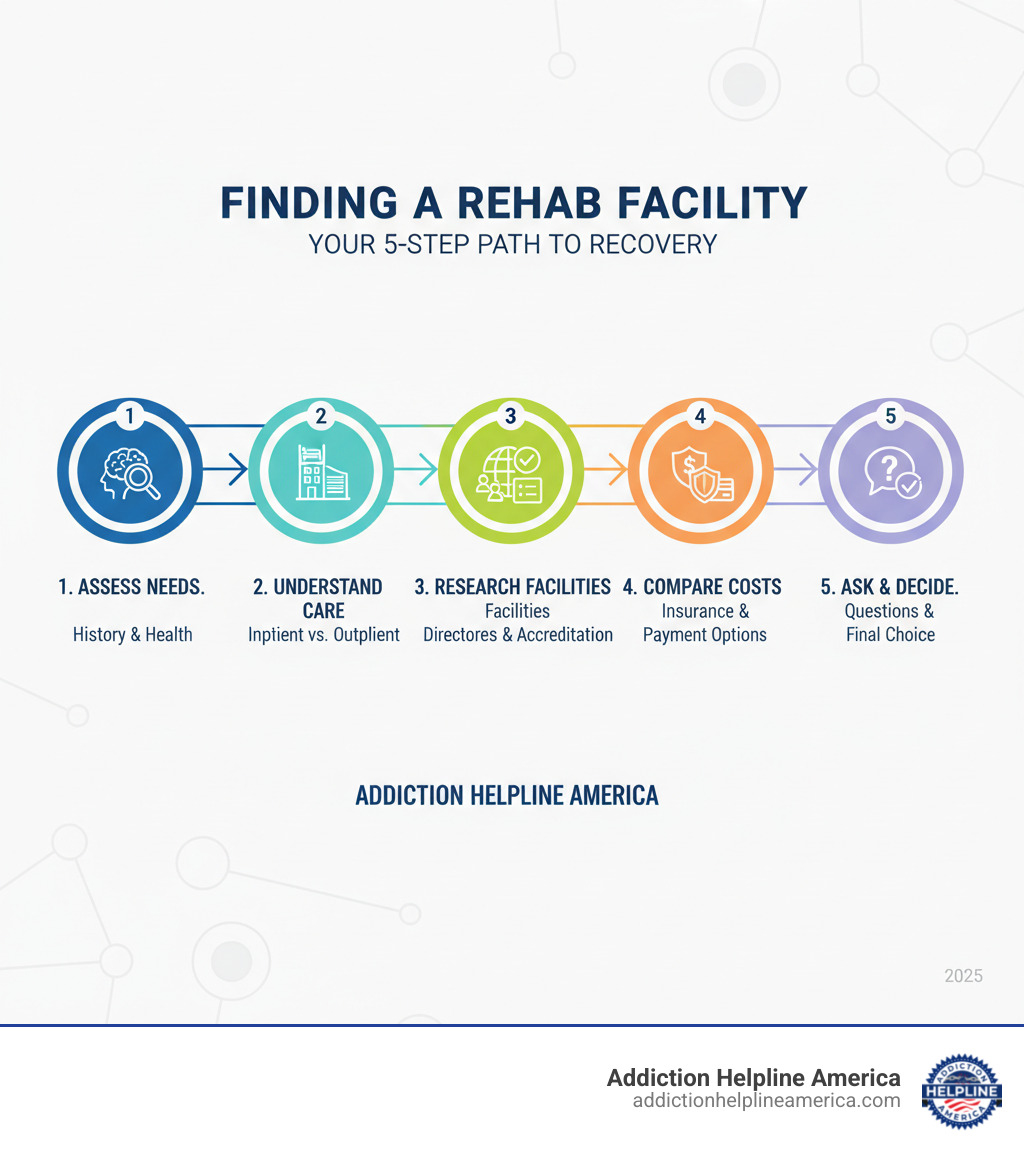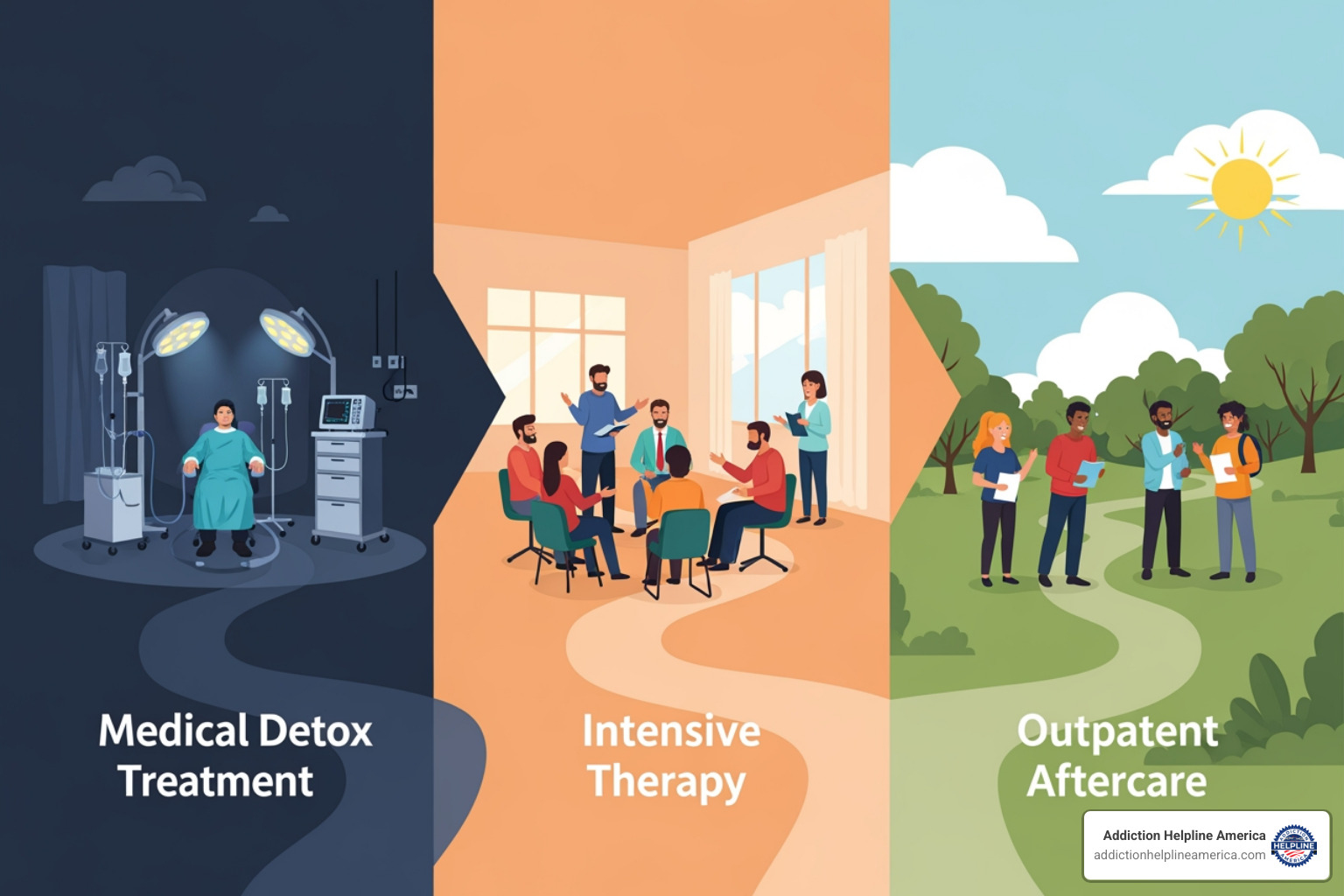
Why Knowing How to Find a Rehab Facility Can Change Your Life
Learning how to find a rehab facility that fits your needs is the most critical step toward recovery. The right program can significantly increase your chances of long-term success, while the wrong one can be a setback. With thousands of options available, the search can feel overwhelming, but you don’t have to do it alone.
Here are the essential steps:
- Assess your personal needs: Identify the substance(s) used, any co-occurring mental health conditions, and your recovery goals.
- Understand levels of care: Determine if you need detox, inpatient, or outpatient services.
- Research and compare facilities: Use reliable resources like FindTreatment.gov or the SAMHSA National Helpline (1-800-662-HELP).
- Verify credentials: Look for accreditations from CARF, The Joint Commission, or state licenses.
- Check insurance and payment options: Confirm coverage and explore financial assistance.
- Ask the right questions: Inquire about treatment methods, staff qualifications, and aftercare planning.
At Addiction Helpline America, we specialize in guiding individuals and families through this process. Our team connects people with life-changing treatment programs custom to their unique circumstances. This guide will provide a clear roadmap to help you find a facility that offers the best chance at lasting recovery.
Terms related to how to find a rehab facility:
Step 1: Assess Your Personal Needs and Goals
Knowing how to find a rehab facility that works for you begins with understanding yourself. The best treatment center matches your specific situation, not just amenities.
How to determine your specific needs for rehab
Consider these key factors:
- Substance Use History: What substances, for how long, and how much? This determines the need for medically supervised detox and treatment length.
- Co-occurring Mental Health Conditions: Many people with addiction also have depression, anxiety, or PTSD (dual diagnosis). Find a facility that treats both simultaneously. See our Mental Breakdown Treatment Complete Guide and Treatment Programs Bipolar Disorder Treatment.
- Physical Health: Ensure the facility can manage any medical conditions like diabetes or heart problems.
- Recovery Goals: Define what recovery means to you. Our First Steps to Recovery resource can help.
- Life Impact: How has substance use affected your job, finances, or relationships? This identifies areas needing attention.
- Underlying Issues: Look for facilities offering trauma-informed care to address root causes.
At Addiction Helpline America, we help you sort through these factors to find the right treatment.
Step 2: Understand the Different Levels of Care
After assessing your needs, understanding levels of care is crucial for how to find a rehab facility. The American Society of Addiction Medicine (ASAM) outlines this continuum:
- Medically-Assisted Detox: Safely manages withdrawal symptoms under medical supervision. See our Best Detoxes Near Me Guide.
- Inpatient/Residential Treatment: 24/7 care in a trigger-free environment with intensive therapy.
- Partial Hospitalization Programs (PHP): Several hours of daily treatment while returning home evenings.
- Intensive Outpatient Programs (IOP): About nine hours weekly, maintaining work/school. See Outpatient Addiction Treatment Programs.
- Traditional Outpatient Rehab: Weekly therapy for mild disorders or step-down care.
- Sober Living & Aftercare: Structured post-treatment environment and ongoing support.
Inpatient vs. Outpatient Treatment: What’s the Difference?
| Feature | Inpatient/Residential | Outpatient (PHP, IOP, Traditional) |
|---|---|---|
| Environment | Live at facility 24/7 | Live at home, attend sessions |
| Intensity | Full-time, 30-90+ days | Part-time schedule |
| Best For | Severe addiction, unstable home | Mild-moderate addiction, strong support |
| Support | 24/7 on-site | During scheduled sessions |
Many benefit from starting with inpatient care and transitioning to outpatient programs.
Everything You Need to Know About Finding a Rehab Facility
Introduction
If you or someone you love is struggling with substance use or mental health issues, you are not alone—and help is available. The single biggest factor in recovery success is finding a treatment program that truly fits your needs.
With thousands of options across the country, the search can feel overwhelming. Programs vary in cost, quality, approach, and specialization. That variety is good—because there is a program for you—but it also makes comparison hard.
At Addiction Helpline America, our mission is simple: help you understand how to find a rehab facility that matches your unique situation. Our team offers free, confidential guidance, using a nationwide network to connect people with quality, evidence-based care.
This guide gives you a clear roadmap: assess your needs and goals, understand levels of care (from detox to outpatient and aftercare), research and compare facilities, verify credentials, and steer insurance and payment options. By the end, you’ll know what to look for and how to ask the right questions—so you can choose a program that supports lasting recovery.
Recovery is possible. Taking this step is brave, and you don’t have to do it alone.
Terms related to how to find a rehab facility:
Step 1: Assess Your Personal Needs and Goals
Before you can figure out how to find a rehab facility, you must first understand your own needs. The best facility is one that matches your specific challenges and goals. This self-assessment is about creating a clear roadmap for your recovery.
How to determine your specific needs for rehab
Consider these key areas to build a comprehensive picture of your situation:
-
Substance Use History: Be honest about what substances you use, for how long, and the frequency. This helps determine the necessary level of care and whether specialized treatments like medication-assisted treatment (MAT) are needed.
-
Co-occurring Mental Health Conditions: Addiction often co-exists with depression, anxiety, or PTSD, a condition known as dual diagnosis. Treating both simultaneously is critical for success. Our Mental Breakdown Treatment Complete Guide offers more insight, and for specific conditions, see our guide on Treatment Programs Bipolar Disorder Treatment.
-
Recovery Goals: What does success look like for you? Whether it’s immediate detox, a long-term residential stay, or a flexible outpatient program, defining your goals helps guide your search. Our First Steps to Recovery guide can help.
-
Physical Health: Inform potential facilities about any other medical conditions like diabetes, heart problems, or chronic pain. Ensure they can provide the comprehensive medical care you need.
-
Life Impact: How has substance use affected your job, relationships, or finances? Understanding this helps identify what life skills and support you need to rebuild.
-
Underlying Issues: Addiction is often a symptom of deeper issues like trauma, grief, or stress. Look for facilities with trauma-informed care or specialized therapies for conditions like anxiety. Our Treatment Programs Anxiety Disorder Treatment Centers page has more information.
By honestly evaluating these areas, you can narrow your search to facilities that are truly equipped to help you.
Step 2: Understand the Different Levels of Care
Once you know your needs, the next step in how to find a rehab facility is to understand the different levels of care. Addiction treatment is a continuum, with options ranging from intensive medical care to flexible outpatient support.
- Medically-assisted detox: This is often the first step, providing medical supervision to manage withdrawal symptoms safely. It is critical for substances like alcohol and opioids. Our Best Detoxes Near Me Guide can help you find a safe facility.
- Inpatient or residential treatment: This is the highest level of care, where you live at the facility 24/7. It offers an immersive, trigger-free environment with intensive therapy and medical support, ideal for severe addiction or co-occurring disorders.
- Partial Hospitalization Programs (PHP): A step-down from inpatient, PHPs involve treatment for several hours a day while you live at home or in a sober living environment.
- Intensive Outpatient Programs (IOP): IOPs offer more flexibility, with about nine hours of therapy per week, allowing you to maintain work or family commitments. Learn more about Outpatient Addiction Treatment Programs.
- Traditional outpatient rehab: This involves weekly therapy sessions and is best for mild substance use disorders or as a transition from more intensive care.
- Sober living options: These transitional homes provide a structured, supportive environment post-rehab.
- Aftercare: Recovery is a lifelong process. Aftercare, including ongoing therapy and support groups, is crucial for long-term success.
Inpatient vs. Outpatient Treatment: What’s the Difference?
The choice between inpatient and outpatient care is a major decision when learning how to find a rehab facility.
Inpatient treatment is an immersive, 24/7 program where you live at the facility. It removes you from daily triggers, providing a highly structured environment with constant medical and emotional support. This is often the most effective option for severe addiction but requires taking time away from work and family and is more expensive.
Outpatient treatment allows you to live at home and attend therapy sessions on a scheduled basis. It’s more affordable and flexible, letting you practice recovery skills in your daily life. However, it requires a stable home environment and strong self-discipline, as you’ll still be exposed to potential triggers.
| Feature | Inpatient/Residential Treatment | Outpatient Treatment (PHP, IOP, Traditional) |
|---|---|---|
| Living Situation | Live at the facility 24/7 | Live at home, attend scheduled sessions |
| Time Commitment | Full-time, 30-90 days | Part-time, hours vary by program |
| Cost | Higher | More affordable |
| Best For | Severe addiction, co-occurring disorders, unstable home environment | Mild to moderate addiction, strong support system, work/school needs |
| Support Level | 24/7 medical and emotional support | Scheduled support during sessions |
The right choice depends on your specific situation. Many people find success by starting with inpatient care and gradually stepping down to outpatient programs.
Everything You Need to Know About Finding a Rehab Facility
Why Knowing How to Find a Rehab Facility Can Change Your Life
If you or a loved one is facing addiction, you’re not alone. The path to recovery can feel overwhelming, but finding the right help is a crucial first step. The right facility can dramatically increase your chances of successful, long-term recovery.
With thousands of treatment centers available, the search can be complicated. How do you compare options, check credentials, and find a program that fits your unique needs? You don’t have to do it alone.
At Addiction Helpline America, we specialize in helping people understand how to find a rehab facility. Our team provides free, confidential guidance to connect you with life-changing treatment.
Understanding how to find a rehab facility involves a few key steps:
- Assess your personal needs and recovery goals.
- Understand the different levels of care, from detox to outpatient.
- Research and compare facilities, verifying credentials like CARF or Joint Commission accreditation.
- Check insurance and payment options to understand costs.
- Ask the right questions about treatment methods and staff qualifications.
This guide will provide a clear roadmap for finding a rehab facility that gives you the best chance at lasting recovery. Recovery is possible, and we can help you find the right place to start.
Terms related to how to find a rehab facility:
Step 1: Assess Your Personal Needs and Goals
To determine how to find a rehab facility, you must first take an honest look at your situation. The best rehab is not the most luxurious, but the one that matches your specific needs.
How to determine your specific needs for rehab
Consider these key areas to find the right treatment:
- Substance Use History: What substances are involved, for how long, and how has it impacted your life? The details determine the level of care and whether specialized programs like medication-assisted treatment (MAT) are necessary.
- Co-occurring Mental Health Challenges: Addiction often accompanies depression, anxiety, or PTSD (a dual diagnosis). It’s vital to find a facility that offers integrated treatment for both. Our Mental Breakdown Treatment Complete Guide can help, and for specific conditions, see our Treatment Programs Bipolar Disorder Treatment page.
- Recovery Goals: What do you want to achieve? Your goals, whether immediate sobriety or long-term life changes, will guide your search. Our First Steps to Recovery resource can help you define them.
- Physical Health: Do you have other medical conditions or take medications that need monitoring? Be upfront about your health to ensure the facility can provide proper medical supervision.
- Life Impact: Has substance use affected your career, relationships, or finances? This helps identify what life skills and support you’ll need in treatment.
- Underlying Causes: Addiction can be a way of coping with trauma, stress, or grief. Addressing these root causes is crucial for lasting recovery. Look for facilities offering trauma-informed care.
This assessment can be difficult, but our team at Addiction Helpline America can help you identify facilities that match your needs, giving you the best chance at lasting recovery.
Step 2: Understand the Different Levels of Care
To find a rehab facility that’s right for you, it’s crucial to understand the different levels of care. Addiction treatment is a spectrum, and the American Society of Addiction Medicine (ASAM) provides guidelines to match individuals with the appropriate level of support.
- Medically-Assisted Detox: This is often the first step, providing a safe, supervised environment to manage withdrawal symptoms. For substances like alcohol or opioids, this is a critical safety measure. Our Best Detoxes Near Me Guide offers more information.
- Inpatient/Residential Treatment: This is the most intensive option, where you live at the facility 24/7. It offers a structured, trigger-free environment with round-the-clock support, ideal for severe addiction or co-occurring disorders.
- Partial Hospitalization Programs (PHP): A step-down from inpatient, PHPs provide intensive treatment during the day, while you return home or to a sober living facility at night.
- Intensive Outpatient Programs (IOP): IOPs offer flexibility, with several therapy sessions per week, allowing you to maintain work or family responsibilities. Explore these options in our Outpatient Addiction Treatment Programs guide.
- Traditional Outpatient Rehab: The least intensive option, with weekly therapy sessions, suitable for mild substance use disorders or as continuing care.
- Sober Living and Aftercare: Sober living homes provide a supportive, transitional environment, while aftercare, including support groups and therapy, is essential for long-term sobriety.
Inpatient vs. Outpatient Treatment: What’s the Difference?
Inpatient treatment is an immersive, full-time program where you live at the facility. It removes you from daily triggers and provides constant support, making it highly effective for severe cases. However, it is more costly and requires a significant time commitment.
Outpatient treatment allows you to live at home while attending scheduled therapy sessions. It is more affordable and flexible, but requires a stable home environment and a high degree of personal motivation to manage triggers independently.
The best choice depends on your addiction severity, support system, and personal responsibilities. Often, a combination of both, starting with inpatient and stepping down to outpatient, provides the most comprehensive path to recovery.
Step 3: How to Find a Rehab Facility and Evaluate Your Options
With clear understanding of your needs, it’s time to research programs. Learning how to find a rehab facility requires careful evaluation. See our How to Find the Right Rehab Center guide.
Key Factors to Consider
- Location: Stay local for family support or travel for a fresh start
- Accreditations: Look for Joint Commission or CARF credentials
- Staff Expertise: Ensure licensed doctors, psychiatrists, and therapists
- Treatment Specialties: Find centers specializing in your needs
- Population-Specific Programs: Veterans, LGBTQ+, teens, or professionals
- Program Length: 90-day programs often show better outcomes
- Amenities: Consider what environment supports your recovery. See Residential Rehab Scottsdale
Evidence-Based Treatment Approaches
- CBT and DBT: Change negative thought patterns
- Motivational Interviewing: Find your motivation for change
- Medication-Assisted Treatment: For opioid/alcohol addiction. See Methadone Suboxone Clinics
- Dual Diagnosis Treatment: For co-occurring conditions. See Treatment Programs Anxiety Disorder Treatment Centers
Reliable Directories
- Addiction Helpline America: Our vetted network at Find a Rehab
- SAMHSA’s FindTreatment.gov: Government directory and National Helpline
- State Health Departments: Licensed facilities by state
Questions to Ask
- Licenses and accreditations?
- Staff qualifications?
- Evidence-based therapies used?
- Dual diagnosis treatment available?
- Staff-to-patient ratio?
- Typical daily schedule?
- Aftercare planning?
- Total cost and insurance acceptance?
Step 4: Navigating Cost, Insurance, and Payment Options
Understanding the financial side of treatment is a key part of learning how to find a rehab facility. While costs can seem high, financial concerns should not prevent you from seeking help. There are many ways to cover the cost of quality care.
Rehab costs vary based on the type of care, location, and program length. While inpatient treatment can cost thousands, the long-term cost of untreated addiction is far greater.
Here are your primary payment options:
- Private Health Insurance: Most insurance plans cover addiction treatment due to mental health parity laws. However, coverage details vary. Always verify your benefits with your provider. Our guide on Insurance Covers Rehab offers more information, and we have specific resources like our Cigna Insurance Rehab Coverage page.
- Government-Funded Programs: Medicaid and Medicare offer comprehensive addiction treatment benefits for eligible individuals. Tricare provides extensive coverage for veterans and active-duty military members.
- Other Payment Options: If you don’t have insurance, many facilities offer flexible payment plans or sliding-fee scales based on income. Self-pay is also an option, and some programs are supported by government grants.
Be open about your financial situation with admissions staff. They are experienced in finding solutions. We can help connect you with facilities that fit your clinical and financial needs.
Frequently Asked Questions about Finding a Rehab Facility
Here are answers to common concerns about how to find a rehab facility.
How long does rehab usually last?
Program lengths vary:
- 30-Day Programs: Initial stabilization and recovery skills
- 60-Day Programs: More in-depth therapy
- 90-Day Programs: Best foundation for lasting recovery
Your treatment team will help determine the right length.
Should I travel for rehab or stay close to home?
- Staying Local: Easier family involvement and existing support
- Traveling: Fresh start away from triggers, access to specialized programs
Consider your home environment and recovery needs.
What if I have a co-occurring mental health disorder?
Dual diagnosis requires integrated treatment addressing both conditions simultaneously. Quality programs have psychiatrists and therapists creating coordinated care plans. Ask about dual diagnosis programs and staff qualifications. See our Mental Breakdown Treatment Complete Guide and resources on bipolar disorder or anxiety.
Take the First Step Towards Recovery Today
You’ve already taken the courageous first step by seeking information. Finding the right rehab facility is within your reach, and you now have a roadmap to guide you.
Recovery is possible. The right treatment program, custom to your unique needs, can help you rebuild your life. It’s about more than just sobriety; it’s about creating a future you can be proud of.
You don’t have to do this alone. Addiction Helpline America offers free, confidential, and personalized guidance. Our specialists will listen to your story and connect you with a vetted program from our nationwide network that fits your needs—whether that involves dual diagnosis care, specific insurance coverage, or a particular treatment approach.
Don’t let the search process overwhelm you. We can help you find the support you need to start your journey.
Your new life is waiting. Take the next step today.
Find the right rehab program for you
Reach out now. We’re ready to help.
Our helpline is 100%
free & confidential
If you or someone you care about is struggling with drug or alcohol addiction, we can help you explore your recovery options. Don’t face this challenge alone—seek support from us.
Programs
Resources
Will my insurance
cover addiction
treatment?
We're ready to help
Find the best
drug or alcohol treatment
center
Are you or a loved one struggling with addiction? Call today to speak to a treatment expert.
















